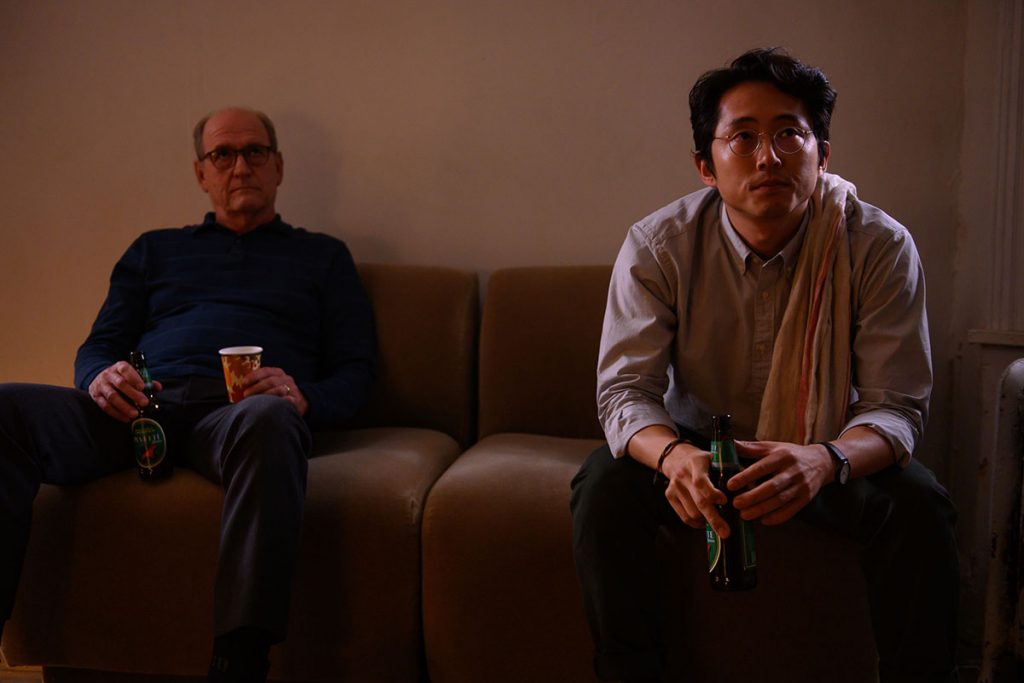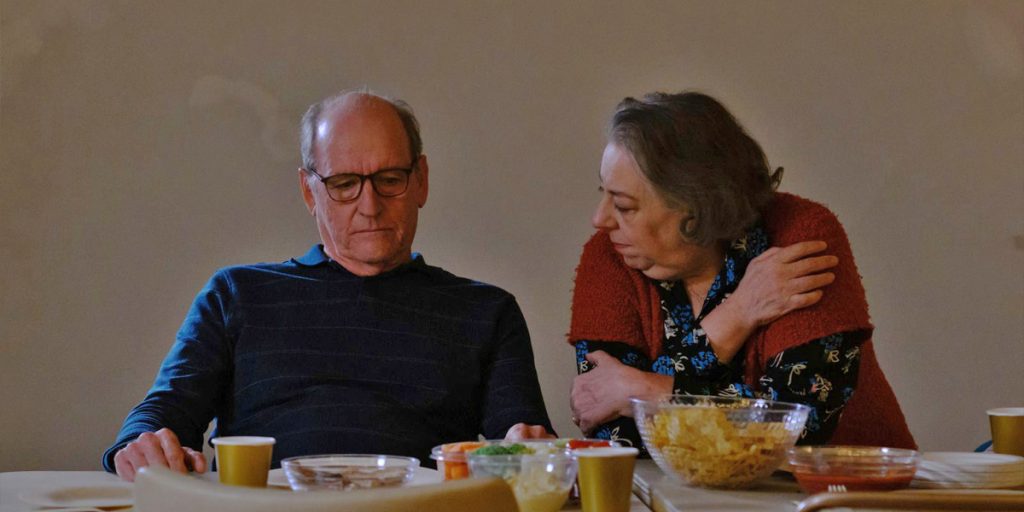The Humans is a dynamite directorial debut for Stephen Karam and a showcase for two of the finest performances of the year from Richard Jenkins & Jayne Houdyshell.
Whenever a beloved play is said to hit the silver screen, there’s a palpable mixture of excitement and apprehension in the air. If a play is adapted inventively, it can become a creative cinematic experience unlike any other, as seen in last year’s The Father from playwright-turned-director Florian Zeller, who perfectly placed us in the deteriorating mind of Anthony Hopkins’ Anthony via dynamic direction and a slyly structured script, resulting in a rollercoaster ride of a film that was equal parts tragic and thrilling. However, that same year, other play adaptations – such as One Night in Miami or Ma Rainey’s Black Bottom – struggled to break free of the constraints of their source material, barely altering their screenplays and staying put in one location for most of the movie, neglecting to adopt any striking visual style throughout their transitions from one medium to another.
As a result, while the words themselves remained weighty, the adaptations overall felt a bit blasé and uninvolving, failing to replicate the power of their theatrical predecessors. While Stephen Karam’s Tony Award-winning one-act play “The Humans” certainly has a strong enough script to warrant an awards-friendly film adaptation, one wouldn’t be judged for worrying about this single-location story retaining its raw resonance in filmic form. However, these fears quickly prove for naught, as Stephen Karam’s directorial debut sets a new standard for stage-to-screen adaptations, with Karam rewriting the rules for what’s possible in bringing a play to the big screen by creating his own compelling cinematic language in just under two hours that allows his intimate epic to evolve while still maintaining what made it so special in the first place.
The Humans tells the tale of the Blake family’s Thanksgiving dinner, set at the apartment of daughter Brigid (Beanie Feldstein, of Lady Bird and Booksmart) and her boyfriend Richard (Steven Yeun, of Minari and The Walking Dead), which they have just moved into. Though at the moment unfurnished, the Blakes try to make the most of the day regardless, with matriarch Deirdre (Jayne Houdyshell, of Little Women and Downsizing) livening up the proceedings with some levity while pessimistic patriarch Erik (Richard Jenkins, of The Shape of Water and The Cabin in the Woods) does his best to not foul the mood any further. Also present are Erik’s mother “Momo” (June Squibb, of Nebraska and Toy Story 4), afflicted with Alzheimer’s disease, and their eldest daughter Aimee (Amy Schumer, of Trainwreck and I Feel Pretty). Together, this sextet share stories, squabble, and strain to sort out deep-rooted issues, all while chilling noises flood the halls of this apartment complex, making for a foreboding atmosphere that leads the family to believe that imminent doom awaits.

As one can surmise just from that simple synopsis, The Humans is a tricky film to nail down tonally, fitting neither fully in the comedy or drama genres – but it’s all the better for it. For a story that aims to so authentically represent the average “middle-class American family,” it makes complete sense that it would alternate between being silly and solemn, much as life does. On stage, “The Humans” was hailed as the “best-reviewed new play in a decade,” praised for its blistering insight into the intricacies of the interactions in modern-day families, and, rest assured, the script hasn’t lost any of that sharp edge upon translation to film, with all of Karam’s witty and wrenching dialogue intact. As on stage, most remarkable of all is the level of realism Karam is able to achieve in his cast’s conversations; at no point do any of their lines feel like the fictional statements they are, crafted from the mind of one lone creator. Instead, it’s as if Karam quite literally recorded a real family’s Thanksgiving Day discourse and put these words to the page, as there’s nary a false or emotionally artificial beat to be found in the entire 108-minute film.
Equally effective is Karam’s subtle depiction of the disintegration of the middle class, conveyed through his characters and their struggles instead of being explicitly “spelled out” in the story. Erik, who did janitorial work at a Catholic high school so his girls could get free tuition, has lost this low-paying job and now has little to show for it. Deirdre, an office manager who was worked the same profession for almost all her life, is watching new employees half her age make twice her salary with a fraction of her experience. And their daughters aren’t faring much better. Aimee is still mourning her separation from her long-term girlfriend whilst simultaneously in danger of being let go by her law firm due to having to take “too much” time off to recover from an intestinal illness, while Brigid, an aspiring composer, is forced to take on a number of “odd jobs” to pay off college debt instead of actively pursuing her aspirations.
At the same time, it’s revealed that Richard – who comes from a far wealthier upbringing – was given the opportunity to essentially “take a break from life” and deal with his depression in his early 30s, with no financial burden whatsoever. While the Blakes also battle such mental maladies, they have to bury their hurt and push on out of financial necessity, while those of Richard’s background can “take some time off.” And, despite their mutual suffering, Karam slyly spotlights how families in strife like the Blakes subsequently turn against one another, instead of leaning on each other for support. Though they bounce back and forth between feuding and fooling around, there’s an incessant desire for each family member to take out their insecurities on those who love them most instead of seeking solace. Rather than sharing their secrets, the Blakes conceal them until they come out in the ugliest manner imaginable. The collapse of the middle class may originate due to the actions of outside forces, but it’s perpetuated by the affected parties redirecting their rage towards those just as troubled.
On top of all this interpersonal torment, the Blakes are burdened by horrifying happenings both above and around them in the apartment complex, such as slammed doors, thunderous thuds, or flickering fluorescent lights – all stimuli that seem to suggest the presence of something supernatural. It is in these scenes where Karam shines most as a director, delivering his take on the “thriller” genre with jump scares that would rival those found in a James Wan film. If the tenseness of the Blakes’ dinner table talk wasn’t enough to set you on edge, surely the sonorous crash of supposed upstairs chaos during one of Erik’s muted monologues will do the trick. Though we’re never given a specific explanation for these eerie noises, they too add to Karam’s overarching theme of the existential extermination of the American middle class, with the Blake family standing in for the entirety of this social group, feeling as if they’re fending for their lives from some advancing atrocity that lives in Brigid’s apartment.
Karam’s chilling – yet oh so captivating – camerawork continues in his claustrophobic filming of the Blake family’s conversations, where the audience is often placed outside a window or around a corner, with the characters out-of-focus or obscured by another object in the apartment. Though we can hear what they’re saying, their actions or expressions may be out of our range of sight, making it seem as if we’re a fly on a wall, observing something we shouldn’t be as Karam makes voyeurs of his viewers. This further adds to the anxiety of the entire atmosphere, a mood also magnified by Lol Crawley’s (The Devil All the Time, Vox Lux) cold cinematography and Nico Muhly’s (Me and Earl and the Dying Girl, The Reader) stress-inducing score.
Across-the-board, The Humans undeniably features one of the best-cast ensembles of any film in recent memory, but it’s the parents who leave the largest impressions, with Richard Jenkins delivering what very well may be the best performance of his long – and legendary – career as the enigmatic Erik, a man losing control of his life and family and coming to terms with the consequences of his actions. Over the course of the evening, Erik becomes more and more fixated on the pains of his past, and he’s slowly taken over by his hysteria, becoming convinced that there’s something sent to make him pay for his sins present in this apartment. Jenkins’ performance is a true tour de force, and he undeniably steals the show, but Houdyshell is surely no slouch as his ditzy wife Deirdre, often serving as convivial comic relief – notably in her playful nagging of her daughters – but landing brutal emotional blows when it counts, particularly in one stagnant shot set on her visage as she lets her burning sadness boil to the surface for the first time.
Feldstein and Schumer turn in similarly winning work, but while we’ve seen the former inhabit this capricious yet charming identity before, the latter is a revelation in her first true-blue dramatic role, proving surprisingly stirring in her darker beats but also dutifully handling the deadpan/dry humor expected of her character as well, becoming a comic highlight in a film of talented stage and film thespians, which is no small feat. Yeun’s Richard isn’t nearly as flashy a personality as these other four, but he grounds the increasingly eccentric events with convincing conviction, providing a critical contrast to the Blakes’ bizarreness.
Anyone who had apprehensions about The Humans’ ability to adapt to the film medium will have those worries put to rest in mere moments in Stephen Karam’s dynamite directorial debut, as the auteur preserves the thematic power of his play while his converting his artistic instincts to make the most of the possibilities of cinema. Assisted by some of the finest performances committed to celluloid this year from Richard Jenkins and Jayne Houdyshell, The Humans morphs into one of the most thought-provoking, theatric, terrifying, and tragic movies of 2021 – and simply one of the best, too.

